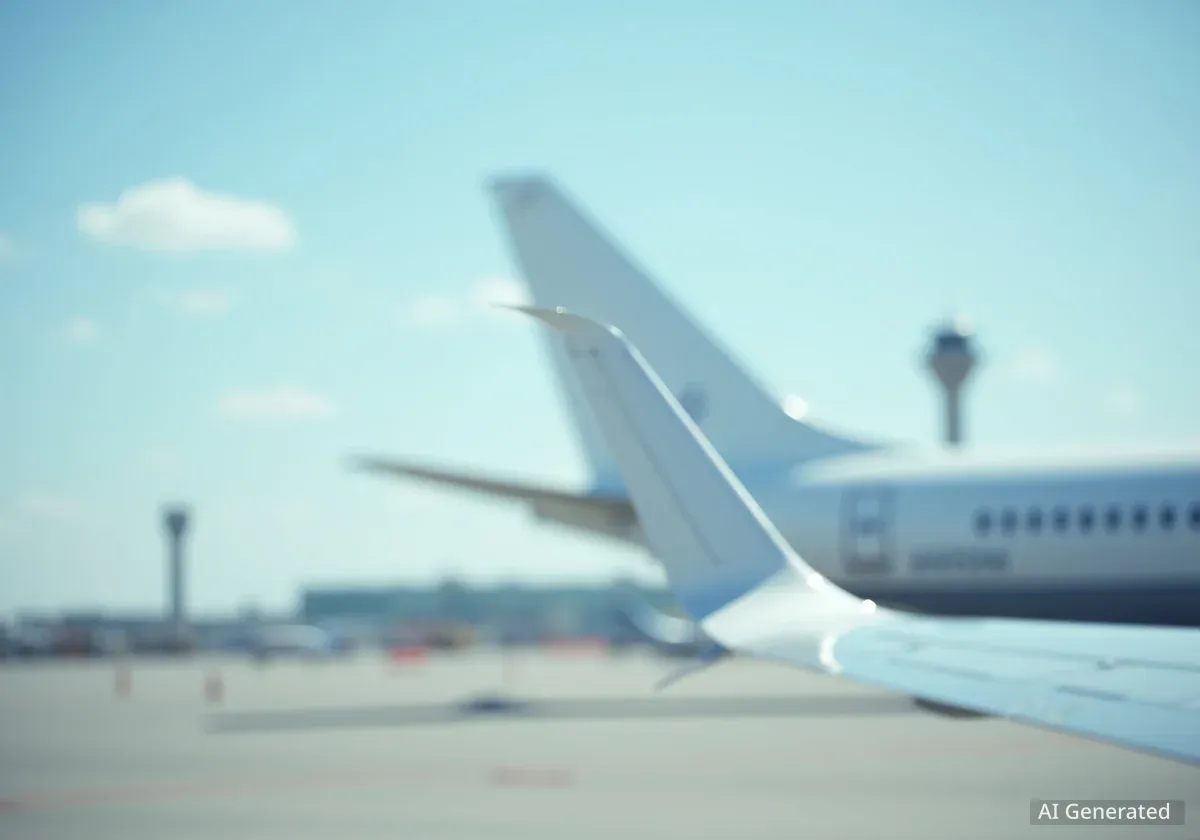The U.S. Transportation Department has ordered Delta Air Lines and Aeromexico to end their joint venture. This decision revokes the airlines' antitrust immunity, which has allowed them to coordinate flights and share revenue since 2016. The move stems from U.S. concerns about Mexico's aviation policies, which Secretary Sean Duffy believes unfairly favor domestic Mexican airlines.
Key Takeaways
- The U.S. Transportation Department revoked antitrust immunity for Delta and Aeromexico.
- This forces the airlines to dissolve their joint partnership, effective January.
- U.S. Secretary Sean Duffy cited Mexico's aviation policies as unfair to American carriers.
- Mexico's President Claudia Sheinbaum stated the changes were technical and for safety.
- The airlines argue the decision will harm consumers and economies in both countries.
US Cites Unfair Advantage for Mexican Carriers
U.S. Transportation Secretary Sean Duffy announced the revocation of antitrust immunity on Tuesday. He stated that maintaining the joint arrangement is not logical while Mexico's policies give its domestic airlines an unfair advantage. These concerns focus on limits placed on passenger and cargo flights into Mexico City several years ago.
This aviation dispute is part of a wider trade disagreement between the two nations. The U.S. government has expressed concerns about border security and tariffs, issues that began under former President Donald Trump. Secretary Duffy specifically addressed Mexico's actions regarding airport operations.
Important Fact
More than 40 million passengers flew from the United States to Mexico last year, making Mexico the top foreign destination for Americans.
Changes at Mexico City Airports
Mexico mandated that cargo airlines begin using the newer Felipe Angeles International Airport in 2022. This airport is located more than 30 miles (48.28 kilometers) from central Mexico City. Before this change, major international airlines largely avoided Felipe Angeles due to its distance, which can lead to a 2.5-hour drive to the terminal.
At the same time, Mexico also reduced available flight slots at the main Benito Juarez International Airport. This reduction was reportedly to allow for construction work. However, Secretary Duffy claims this construction has not occurred.
"Empty promises mean nothing. After years of taking advantage of the U.S. and our carriers, we need to see definitive action by Mexico that levels the playing field and restores fairness," Secretary Duffy said.
Mexico's Response to Aviation Changes
Mexican President Claudia Sheinbaum addressed the U.S. threats in July. She stated that the transfer of cargo operations from Benito Juarez to Felipe Angeles was a technical decision. President Sheinbaum emphasized that any future changes should be based on technical criteria and prioritize safety.
According to President Sheinbaum, there is no reason to impose sanctions related to this matter. She clarified that Mexico's decision was not aimed at U.S. airlines. Instead, it aimed to relieve congestion at the older Benito Juárez airport, which was facing operational strain.
President Sheinbaum acknowledged that some U.S. companies initially complained about the change. However, she noted that they eventually adapted to the new operational environment at Felipe Angeles International Airport.
Background Information
The antitrust immunity granted in 2016 allowed Delta and Aeromexico to operate as a single business entity for flights between the U.S. and Mexico. This facilitated joint pricing, scheduling, and revenue sharing, aiming to offer more routes and competitive fares.
Impact on Delta and Aeromexico Operations
Delta and Aeromexico have expressed disappointment with Secretary Duffy's decision. Both airlines are currently evaluating whether to challenge the order. They argue that they should not be penalized for actions taken by the Mexican government.
The airlines also contend that consumers and the economies of both the United States and Mexico will suffer from this decision. Last year, Delta and Aeromexico operated more than 30,000 flights between the two countries, according to aviation analytics firm Cirium. This volume highlights the significant role their partnership played in cross-border travel.
- Delta stated the decision "will cause significant harm to U.S. jobs, communities and consumers traveling between the U.S. and Mexico."
- Aeromexico commented that the decision "overlooks the benefits that the alliance has brought to connectivity, tourism, and consumers in Mexico."
Future of Airline Cooperation
The two airlines will still be able to cooperate, but their collaboration will be less integrated. They will no longer be able to jointly set prices or share revenues. This means each airline will have to manage its own pricing and scheduling for routes between the U.S. and Mexico.
In regulatory filings, Delta and Aeromexico projected significant negative impacts. They estimated that the loss of direct flights could deter over 140,000 American tourists and nearly 90,000 Mexican tourists from visiting the other country. This reduction in tourism would consequently hurt both national economies through lost spending.
The airlines also maintained that their alliance did not prevent other carriers from competing. They pointed out that rival airlines Viva Aerobus and Volaris expanded their operations at Benito Juarez airport after Interjet ceased operations during the pandemic. Although Aeromexico also acquired half of Interjet's former slots and expanded its presence in Mexico City, the competitive landscape remained active.
Timeline and Next Steps
Secretary Duffy's order is scheduled to take effect in January. Until that time, there will be no immediate changes to existing flights or loyalty programs offered by Delta and Aeromexico. Passengers holding tickets or planning travel in the coming months should not experience disruptions before the new year.
The airlines will have to adjust their operations to comply with the order. This will involve significant changes to their flight networks, pricing strategies, and customer offerings for U.S.-Mexico routes. The long-term effects on airfares and available routes for travelers remain to be seen.





